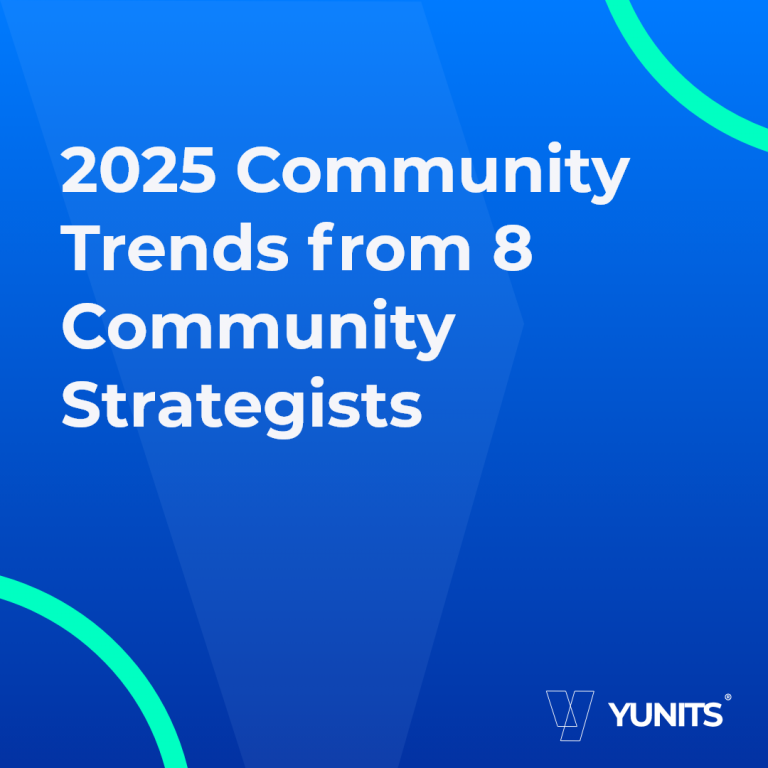The day-to-day work of a community manager: 7 responsibilities
As a community manager, you facilitate contact with your audiences, such as members, stakeholders, patients, fellow sufferers or students. You create trust within your community, encourage participants to actively contribute and let them experience the value of your community. In doing so, you also create a strong bond between your brand and your target audience. And it probably will not come as a surprise that in this digital age this work is more important than ever.
Community management is not a 9-to-5 job
A community manager does not have a typical 9-to-5 job. Comments, emails and ratings come in all day (and night). Events relevant to your participants do not adhere to a fixed schedule. Sometimes it is necessary to respond to them outside ‘normal’ working hours. It is therefore important that you have passion for your profession. You have to enjoy being busy with your work and constantly trying new tactics. A community is a living organism. And you have to move with it.
So a community manager is someone who manages a group of people online, moderates and sets and guards those guidelines. Every day you work at the operational level, a bit less frequently at the tactical level and, for example, once a quarter at the strategic level. From the outside, it may seem that an online community arises by itself, but this is not the case. Behind almost every positive, thriving online community is a successful community manager.

Responsibilities and duties of a community manager
The daily work of a community manager can be divided into several tasks. What are these?
1. Thoroughly know and understand your community
Analyse your community and really get to know your members. This gives you insights into their needs and interests and gives you tools to respond with content and other solutions. The better you know how to apply this, the more your target audience will appreciate and value your community.
How best to connect your members differs per organisation and industry. This can be through social media, for instance, but more and more organisations are opting for their own platform. We also see organisations that have their own platform using social media channels to recruit new participants. Look at your target audience and determine their needs.
2. Map out a strategy
Successful community managers map out their strategy based on what their target audience needs and create a plan of action. Questions that matter here are:
- What are the shared interests of the community and organisation?
- On which target audience should your focus?
- What type of community is your community?
- What is important to your target audience regarding topics, what are members interested in, and what do they want to achieve or discover online?
Truly successful community managers involve their community in determining the community’s purpose. The Volunteer Functions Inventory, a tool for researching volunteer motives, shows that there are different reasons for volunteering. You can apply this to a community.
3. Encourage engagement
Another important part of a community manager’s job is to encourage engagement among community members. Consider facilitating participation in conversations, welcoming new members, encouraging them to respond, asking questions and involving power users to spark discussion. Organising a challenge or contest can also help boost interaction.
Try to see external problems your target audience faces as ways your community can help them with those problems. This is crucial for a vibrant community.
A recent example regards energy prices. This is an external development that members of your community may be concerned about. For many sectors, this leads to cost increases. A community offers the opportunity to exchange ideas on how to deal with this and learn from one another. A platform also allows fellow sufferers to find each other and experience moral support in this way.
Also read: 12 tips to encourage activity in an online community
4. Keep track of the community calendar
As a successful community manager, you know what content your community is expecting. Blog articles, infographics, e-books, you name it. Together with SEO specialists, content marketers and graphic designers, you create this content. But, you are responsible for managing it all.
Many community managers work with a community calendar. They gather input for this by looking closely at the number of reactions, the number of page views or conversion rates on call-to-actions. You also talk to participants and keep an eye on external media and experts. This will help you to better know which issues connect with the interests and needs of your community. Based on that analysis, you will know where to focus your efforts in the future.
A good community rhythm, where you publish content and encourage interaction on a regular basis, is also essential. Then your members get used to it and it becomes part of their work rhythm or life. So, in your calendar, you should have different types of activities. The frequency with which you mention them varies. To create a reliable community calendar, you need to be clear about your ambitions and goals, so that your actions match them.
A community calendar is slightly different from a content calendar. A community calendar mainly contains activities to stimulate activity. If your community also has a database of expertise, it is, of course, important to post content regularly.
5. Analyse data
For a community manager, data is essential. What is the engagement rate? How fast is your membership growing? How much traffic is coming to the website? All questions you need to know the answers to.
In addition to these quantitative measurements, you obviously also do qualitative research. Is your content delivering the expected results? If not, change old habits. Be creative and try new things.
6. Share knowledge
As a community manager, you are therefore the bridge between your organisation and your members or followers. Therefore, you know much more about the needs and interests at play in your community than, say, your colleague from marketing. While that knowledge does matter for the effectiveness of your marketing efforts.
Passing on your knowledge in the form of training courses or presentations to other departments within your organisation is therefore crucial. This way, colleagues can do their job even better and your organisation is more likely to communicate consistently with your stakeholders.
In addition, they can also sufficiently focus on the business side. Make sure your community continues to add value to your organisation and share it internally. Otherwise, you run the risk of having less budget after a year, because people no longer see the relevance of your community.
7. Assist participants
A community manager’s last – but by no means least important – task lies in user assistance. Think of technical support, adding and managing user data and managing databases. In addition, a community manager is also the first point of contact for suppliers of the software needed for the online community.
In other words, are you a successful community manager?
As you can see, the daily work of a community manager is very varied. You are busy creating content, encouraging interchange, as well as analysing it. And above all, you are networking, creating a bond with your community, and making sure your target audience knows how to find each other.
Community management pays off
- You have a continuous stream of valuable information from your target audience. Your organisation can use this to become more market-oriented.
- You establish a (long-term) relationship between your organisation and its community.
- Branding gets a boost.
The following qualities will therefore come in handy: empathy, good social skills, and creativity. It is a job that you learn quickly in practice, but it is especially important that you enjoy the work.
Gone are the days when your community could only reach you from 9-to-5. Even after working hours, your community will be able to engage. And sometimes it is necessary to respond immediately.
In short, are you a networker, content creator, instigator and can you monitor different platforms and channels well? Then you have what it takes to become a successful community manager!
Would you like to become a community manager?
Or do you want more tips on the opportunities and possibilities of an online community? Feel free to contact us; we would be happy to provide advice.
Also read

How can your association stay relevant in a digital world?

Why choose a Yunits community platform over Microsoft Teams?

